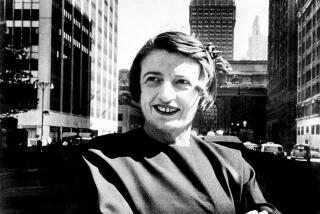Will Sarah Palin’s ‘Going Rogue’ boost her political fortunes?
You may not be able to judge a book by its cover, but you often can tell something from its title -- and Sarah Palin’s “Going Rogue: An American Story,” due out on Tuesday, front-loads expectations in ways most political books do not.
FOR THE RECORD:
“Going Rogue”: An article in Thursday’s Calendar about “Going Rogue: An American Life,” the book by Sarah Palin due out Tuesday, misstated the subtitle as “An American Story.” —
With a first printing of 1.5 million copies, HarperCollins hopes that marketing the book to the 2008 Republican vice presidential candidate’s conservative political base will help counter what has been a slow book-buying market.
Neither Palin nor HarperCollins has said how much she will get for the book, though there were reports of a $7-million deal. (She has already received an upfront payment of $1.25 million, according to an Alaska financial report she was required to file, which detailed a “retainer” for the book. Now that she’s out of office, she doesn’t have to report on any subsequent earnings publicly.)
“Going Rogue” is already near the top of online bestseller lists based on presale orders, and national television appearances next week with Oprah Winfrey and Barbara Walters will probably keep it there. In the category of “any publicity is good publicity,” a satire of the book, “Going Rouge,” compiled by two editors at the Nation, comes out the same day.
But whether Palin’s hastily turned memoir -- six months from announcement to publish date -- succeeds in bolstering her flagging political image will depend largely on what’s in it, and on what the emergent conservative voice of the Republican Party wants to do with the rest of her life.
Since quitting as Alaska governor this summer, Palin has been coy about her future. The two leading options: making another run for national office or following former Arkansas Gov. Mike Huckabee into the celebrity-pundit circuit -- though those aren’t necessarily mutually exclusive.
Bus tour
In fact, Palin’s announced book tour sounds more like a campaign swing. Some of it will be by bus, and she will bypass media -- and Democratic -- centers like Los Angeles and New York City for Grand Rapids, Mich., where the tour begins Nov. 18; Rochester, N.Y.; Roanoke, Va.; and Albuquerque, N.M.
A separate version of the book will be published simultaneously by HarperCollins’ religious imprint Zondervan, a clear sign that the company, which is owned by Rupert Murdoch, hopes her social-conservative popularity will spur sales.
But the bigger question is whether the book can broaden Palin’s appeal outside her narrow base.
“A key group is center-right Republicans who do not take her seriously right now but are lukewarm toward Romney and absolutely can’t abide Huckabee as the party nominee,” says Dante Scala, a political analyst at the University of New Hampshire. “Another question: How wonky will it be as opposed to a campaign tell-all that speaks to the converted?”
Palin, a first-term governor, was plucked from obscurity by Republican presidential nominee Sen. John McCain in August 2008 and tossed into the electoral version of the Roman Colosseum. Palin quickly earned the enmity of top McCain strategists by straying from the agreed-upon playbook -- or “going rogue.” Critics concluded that Palin wasn’t ready for prime-time politics.
The frictions didn’t lessen after McCain’s loss to Barack Obama, and Palin’s post-election brawl with McCain advisors like Steve Schmidt hasn’t done much to help either of their images.
It’s unclear how much cachet Palin has with the heart of the Republican Party. In an October CNN/Opinion Research poll of Republicans, Palin was the only 2012 potential contender to have a higher unfavorable rating (51%) than favorable (42%).
Although a book that offers a scathing rehash of the campaign would burn some political bridges -- and probably not help that unfavorable rating -- it could solidify her standing among the right as the GOP wrestles with a philosophical schism between social conservatives and moderates.
If Palin doesn’t want to run for national office again, pulling out the flamethrower in “Going Rogue” could be a good foundation for a career on the talking-head circuit.
“If her goals are to continue to be a Republican conservative celebrity, then I think this book will no doubt help her,” says Dee Dee Myers, who served as White House press secretary during the first two years of Bill Clinton’s presidency.
But as a platform for national office, the book -- written with San Diego ghost writer Lynn Vincent -- is a roll of the dice.
“It could make her look like a more substantive and sober leader with good judgment,” Myers says. “Or it could make her look like a crazy partisan hack.”
‘Interesting person’
Ken Khachigian, who, as a longtime advisor and writer for Richard Nixon, knows a bit about making phoenixes rise from the ashes, doesn’t see a downside no matter what Palin’s plans are.
“Controversy is not necessarily bad, and she will, because of who she is, survive her critics,” he says. “She has created herself as an interesting person, and that’s one of the Nixon dictums -- the worst thing in politics is to be dull.”
Nixon wrote “Six Crises” after he lost his first run for the White House, Khachigian says, adding that although it “didn’t help him in 1962” -- when he famously lost the California gubernatorial election to incumbent Pat Brown -- “it kept him in the public eye.” After his resignation in the wake of the Watergate scandal, Nixon again resuscitated his image in part through writing a memoir.
Khachigian predicted Palin’s book will be panned by critics, but “that doesn’t mean it won’t be a bestseller. Nixon’s books were panned, usually, but most of them turned out to be bestsellers, especially his memoirs.”
There is a difference between a successful book and a successful politician, says Bill Carrick, a Democratic strategist and former media consultant to Clinton, the late Sen. Ted Kennedy and Sen. Dianne Feinstein. A campaign is about winning a plurality. A book is about sales. “There is an audience for a Sarah Palin book,” Carrick says.
Other candidates have used books as campaign props, including Obama. His “Dreams From My Father,” first published in 1995, and “The Audacity of Hope,” which came out as he was preparing to run for president, were bestsellers that helped voters get a better sense of a man they knew little about.
Similarly, John F. Kennedy’s “Profiles in Courage” helped propel his 1960 candidacy. But George McGovern’s “The Colorado Coal Field War” (a rewrite of his doctoral dissertation from the early 1950s) did nothing to help his 1972 campaign.
McGovern’s former campaign aide, Gary Hart, who went on to become a presidential contender himself, has written several books that Carrick says are “very good. He’s a . . . good political thinker on large questions. But they didn’t sell like those others did.”
Ironically, whether Palin’s book is considered a success could come down to a key component of political primaries -- results versus expectations. With a 1.5-million first printing, the bar is high. If sales bottom out shortly after the initial release frenzy, the perception would be that Palin had fallen short.
Again.
“That,” Carrick says, “would be bad.”
More to Read
Sign up for our Book Club newsletter
Get the latest news, events and more from the Los Angeles Times Book Club, and help us get L.A. reading and talking.
You may occasionally receive promotional content from the Los Angeles Times.







